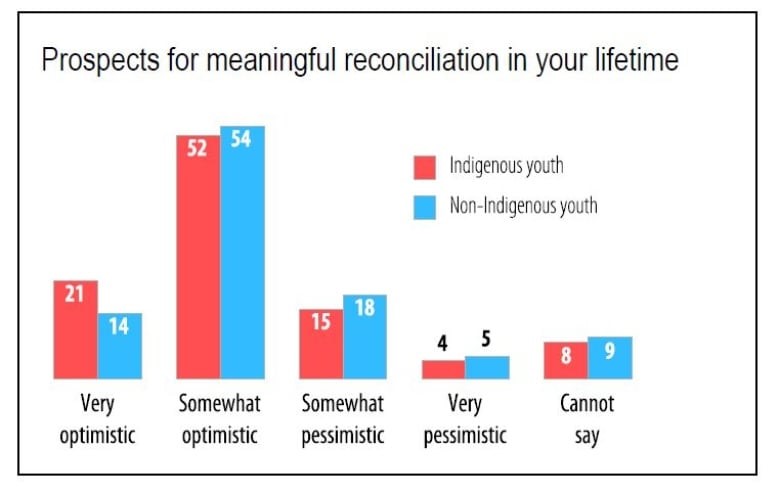Canadian Youth Reconciliation Barometer
Research on the state of reconciliation in Canada
Research conducted by Environics Institute in partnership with Canadian Roots Exchange and the Mastercard Foundation sheds light on how youth in Canada understand the state of reconciliation.
Results reveal that youth in Canada are aware and engaged when it comes to the history of Indigenous-non-Indigenous relations and reconciliation. In fact, there is a striking alignment between Indigenous and non-Indigenous youth on many of the issues covered in the research and similarities in perspective stand out much more than the differences.
Both populations generally agree about:
- Canada’s colonial legacy of mistreatment of Indigenous Peoples;
- the importance of making positive changes and the obstacles that stand in the way;
- what reconciliation is all about; and
- optimism about realizing reconciliation in their lifetime.
Indigenous and non-Indigenous youth in Canada share the same broad life goals, which include a successful or meaningful career, family and children, financial independence, and living a balanced life, with Indigenous youth placing greater emphasis on goals for education.

Respondents were asked, “Thinking about the future, are you optimistic or pessimistic that there will be meaningful reconciliation between Indigenous and non-Indigenous people in your lifetime?” Three-quarters (75%) of Indigenous youth and two-thirds (68%) of non-Indigenous youth say they are somewhat if not very optimistic that there will be meaningful reconciliation between Indigenous and non-Indigenous people in their lifetime, compared with roughly one in five who expresses pessimism.
About the research
The Environics Institute for Survey Research, in partnership with Canadian Roots Exchange and the Mastercard Foundation, created the Canadian Youth Reconciliation Barometer to establish benchmark indicators for the state of reconciliation among the country’s youth.
The primary objective of this social research initiative is to generate credible, independent, empirically-derived evidence that will be broadly accepted across Canadian sectors and communities. It is intended to serve as point of common ground that brings different stakeholders together, and as a means of measuring progress (or the lack of) over time.
The research focuses on the beliefs, attitudes, priorities, behaviours, and experiences as they pertain to relevant dimensions of Indigenous-non-Indigenous relations, and reconciliation in particular. This study will establish benchmarks that provide a measure of the state of reconciliation among Canada’s youth as a whole and within specific population segments. It will produce a set of indicators that can then be used in future surveys to build upon the benchmark as a means of charting trends at a national level, as well as within specific communities of interest.